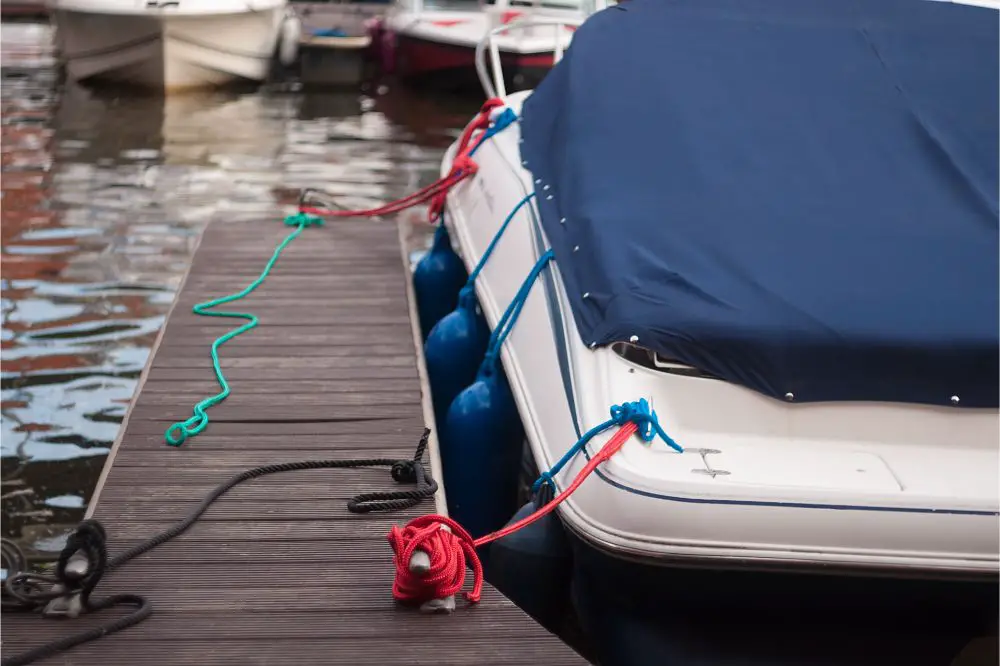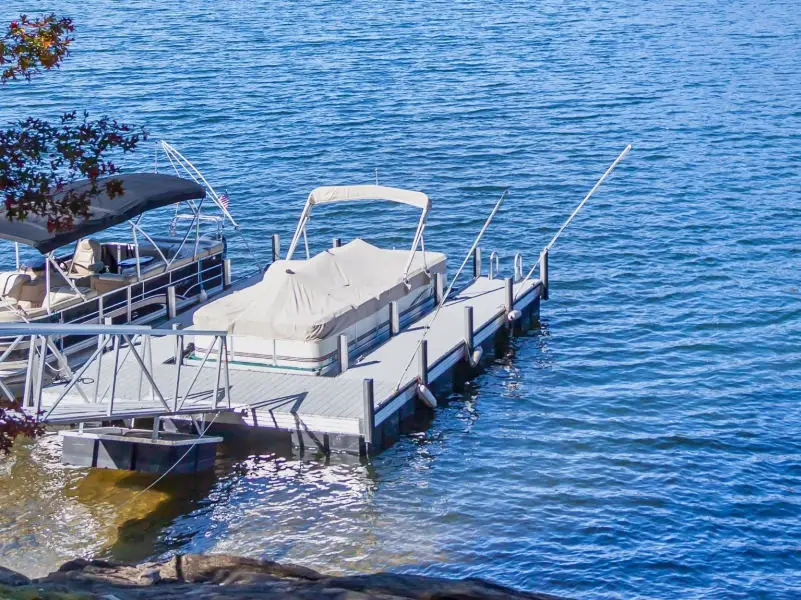With winter nearing, many pontoon boat owners are preparing to store their boats for the winter. In the coming cold months, it’s highly important that your boat is well-protected from the harsh winter elements and that it is ready for use at the end of winter.
Some boat owners may consult or hire a professional to help cover and store their pontoons. However, others choose to do it themselves. This article is primarily for the latter. Before taking you through the steps of covering your pontoon boat for the winter, we’ll discuss why you need a cover for your boat and the steps to take before covering your pontoon boat for the winter. We’ll also share tips to help you safely store your boat.
Note: most links in this article are Amazon.com Affiliate links, see Affiliate Disclosure, thank you.
Reasons Why You Need a Cover for Your Pontoon Boat
Although boat covers aren’t the best solutions in areas that receive substantial snow accumulation, they still have a few uses. Below are four reasons why you should use a cover for your pontoon boat.
1. Protection
Boats can be scratched or dented by falling twigs, branches, and other objects. Using a cover on your pontoon boat prevents it from scratches and dents. It also protects the boat’s interior from the sun’s harsh rays, preventing fading.
2. Discourages Pests and Critters
When a boat is exposed, bugs, birds, and other pests can make it their home, filling it with droppings. Covering your pontoon boat will ensure that fauna don’t climb in and make a mess of your boat.
3. Discourages Casual Theft
The chances of being robbed of boat equipment are significantly reduced when the gear on your boat is hidden beneath a cover. It discourages people from looking in, and thieves may consider it more work to remove the cover than the gear is worth. These can help whether in your home driveway, public storage, or at a boat moorage dock for the winter.
4. Saves Money
Using a boat cover offers you a way to safely store your boat when not in use. It helps you save money on storage costs.
Steps to Take Before Covering Your Pontoon Boat for the Winter
Clean Your Boat. You should clean your boat inside and out and remove grime, barnacles, and dust from the exterior. It would be best if you also created a protective barrier using polish.
Remove Equipment. Your fishing equipment, water sports equipment, and floatation devices can trap moisture and cause mildew. To prevent this, remove such equipment from the boat before covering it up. Remove all electronic equipment, too, as moisture can damage them.
Prepare the Engine. Spray fogging oil into the spark plug holes and carburetor. Fill the gas tank to at least the three-quarters mark, leaving enough room for condensation. Finally, replace your oil filters.
Use Antifreeze. Drain any coolant from your engine and use propylene glycol-based antifreeze instead. Avoid using ethylene glycol-based antifreeze as it can release toxins in the water.
Remove the Battery. You don’t want to have a drained battery when spring arrives. To maintain your battery’s life cycle, disconnect and store it somewhere cool and dry. Charge it fully before storing it, and ensure you don’t forget about it. You’ll need to check on it and top it up throughout the winter. Some people also remove their electric trolling motors, but in a mild climate, it is not necessary if you can get it under the cover.

How to Cover Your Pontoon Boat in the Winter
Step 1. Remove the bimini top
Retract the bimini top and store it away. This is necessary before you can put up the frame for your boat’s cover.
Step 2. Set up Your frame
You’ll be making your frame with a few items. You’ll need a couple of 10-foot long, 45-degree elbow, T shape, and cross PVC tubes. To efficiently put the framework up, you’ll also need zip ties, a drill, bits, screws, and a hand saw.
Step 3. Place your cover over the framework.
There are different pontoon boat covers, so ensure you get the right one. Roll out the cover over the framework. Once the boat is well covered, run your straps through loops along the edge of the cover at short intervals. Fasten the straps along the trailer frame and tighten them for a secure fit.
Common Mistakes to Avoid when Storing Your Boat
The main reason for winterizing and covering your boat is to keep it protected through winter. However, many boats are found in poor condition when winter’s over because boat owners make some mistakes when putting their boats away. Below are some common mistakes you can avoid when storing your boat.
1. Using the Wrong Cover
There are various covers that serve different purposes. Using summer mooring or travel covers for outdoor winter storage may result in a disaster, as these covers are made in different manners and with different materials. Covers used in the winter are made from a waterproof polyester laminate material. The cover protects your boat from the harsh winter elements and snow slides right off it.
2. Leaving Bimini Tops Up
Some leave their boat enclosure or bimini top up during the winter, hoping it will protect their boats from the elements. However, your bimini top or boat enclosure is not designed to protect your boat from the snow or other elements. Exposing your bimini top or enclosure will cause it to deteriorate, so ensure it’s properly stored away.
3. Leaving Your Boat Uncovered When Stored Indoors
Some boat owners are under the misconception that they don’t need to use a boat cover when their boats are stored indoors. However, this is not true, as your boat’s interior can be covered in debris and dust come springtime. It is particularly messy if you have birds in the area.
4. Using the Wrong Cover Size
Many boat owners purchase a universal boat cover. While some do this because it’s budget-friendly, others don’t realize how important it is to have a cover that’s suited specifically for your boat. Having the proper fit for the boat is crucial. A cover that’s too large will flap in strong winter winds and rub against your boat. This will damage both the boat and the cover. A cover that’s too small will not cover every part of your boat and will expose your boat to debris, snow, and ice.
Conclusion
Covering your pontoon boat for the winter will protect it from the harsh elements and help you have an easy launch in the spring. You may find setting up the framework a little complex, but you can do without the framework. Spread the cover over your boat and ensure it’s strapped securely.




[…] you opt for a permanent canvas cover custom-made for your boat or shrink-wrap it all year long, covering your boat is a costly investment. While you might be tempted to construct your own framing and use […]